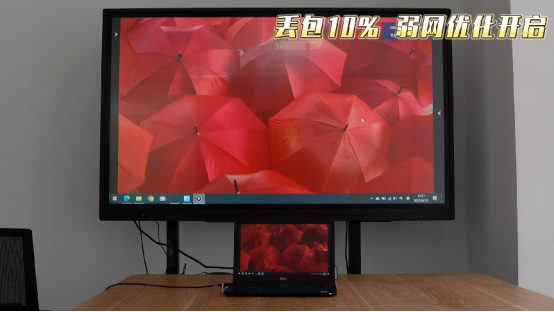Specifically, this feature reduces the occupation of network bandwidth and transmission delay by optimizing data transmission algorithms and reducing screen mirroring resolution, thereby enhancing users’ screen mirroring experience in weak network environments.
After professional tool testing, the Bijie Multimedia Collaboration System can still maintain screen mirroring even under 10-20% network packet loss, indicating that the device has considerable adaptability and stability in the face of unstable factors in the network environment.
It is worth mentioning that the Bijie Multimedia Collaboration System not only performs well in key parameters such as packet loss rate, bitrate, and frame rate, but also supports adjusting screen resolution and visualizing signal strength. This means that users can flexibly adjust the clarity and stability of screen mirroring according to their own needs and network status. At the same time, real-time display of signal strength also allows users to intuitively understand the current network status, enabling timely adjustments and ensuring the smooth progress of the screen casting process.

In practical applications, this function can play an important role in various situations. For example, in classrooms, conference rooms, or other places where real-time information display is required, even if the network environment is unstable or bandwidth is limited, the Bijie Multimedia Collaboration System can ensure smooth transmission of screen cast content, avoid lag or delay caused by network problems, and thus improve communication efficiency and learning effectiveness.
At the same time, the Bijie Multimedia Collaboration System also has many other advantages, such as supporting USB Touch reverse control, screen mirroring control for Android phones and Windows/Mac computers, as well as built-in image, video, and subtitle push functions. These features further enhance the practicality and user experience of the system, making it widely applicable in the field of multimedia collaboration.
It should be noted that although the weak network adversarial function can improve the screen casting effect to a certain extent, transmission instability or delay may still occur in extreme network environments. Therefore, when using the screen mirroring function, it is recommended to choose environments with better network conditions as much as possible to achieve the best screen mirroring effect.
Overall, the weak network adversarial function of the Bijie Multimedia Collaboration System is one of its important features, which can maintain smooth and real-time screen casting in weak network environments, improve user experience and communication efficiency.